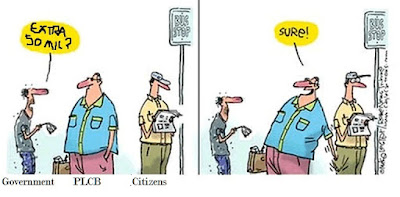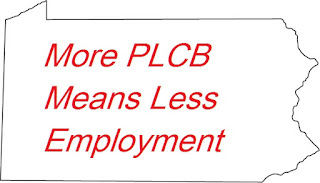We've posted a number
of stories about how bad flexible pricing is for the people, the
consumers, in Pennsylvania. It is potentially the worst thing ever to come from the police-enforced liquor monopoly.
Despite that, here are some of the "benefits" flexible pricing will bring, according to the Chairman of the PLCB Tim Holden. You probably want to take his thoughts with a grain of salt; Ol' Tim still doesn't know the difference between Jack Daniel's and bourbon, and probably doesn't care.
It seems that Tim is upset that some
suppliers don't care about PLCB profits. Well, why should they?
Businesses do not exist so that the PLCB can over-charge the citizens. They
exist to do as well as possible for their owners, their shareholders. To assume
that a business should care about the success of an agency that depresses their
sales performance is ludicrous in the extreme and just reinforces how out of
touch the PLCB leadership is.
 |
| This is how PLCB flexible pricing is really going to work |
Back in April, well before the passage of Act 39,
Elizabeth Brassell, the PLCB director of communications, wrote to me: "You are correct that the Liquor Code does not indicate
that prices can’t be negotiated or that the PLCB has any obligation to use
manufacturers’ suggested retail prices. In fact, as you suggest, the PLCB’s
buying power, as well as its discretion to list and delist products, allows for
some price negotiation with vendors. However, any advantages obtained through
volume purchases are directly reflected in the shelf price." Did they do
this? Of course not, because it had no benefit to the PLCB, only the customers.
Chairman Holden tacitly admitted that saving consumers money wasn't all that important when he said: "The PLCB is driven by priorities made clear by the governor and General Assembly: (1) increase customer convenience; (2) generate additional revenue; and (3) achieve more-competitive retail pricing." It seems that the General Assembly priority is more #3 because they, like most citizens, want to get the PLCB out of the retail and wholesale alcohol business.
Holden goes on to say:" We simply want more competitive costs from our suppliers – comparable to what other states and retailers enjoy." Except that while those other retailers pass on those cost reductions, because they want your business, the PLCB wants to keep that difference, to keep that money to bolster their bloated and failing organization.
They have no reason to pass on anything because they have no competition; there is nowhere else the consumer can legally go. Holden admits this: "We’ll also maintain the current retail price on the vast majority of products we sell, while achieving greater profit on hundreds of them. And, as we’ve said all along, prices will increase for some items, when the supplier and PLCB agree that the market can bear the increase." Of course, when there is no other choice of retailer, the market can bear a lot.
Think I'm over reacting? Here
are some new prices from the PLCB under the "flexible" system on some pretty price insensitive items they know they can bleed enthusiasts for:
Think that is bad? Look what happens if you are unlucky enough to win a package deal.
Thirty packages are available with three bottles each: the 20 year, 12 year, and 10 year. The price for each three-bottle package is $999.99; $570 MORE than the individual bottles. There are six packages of four bottles each: the 20 year, 15 year, 12 year, and 10 year. The price for each four-bottle package is $1,199.99: $620 MORE than the individual bottles. And four lucky Pennsylvanians will get the opportunity to buy packages that include each of the six 2016 bottlings, at price of $1,999.99. Only $860 MORE than the individual bottles. Such a deal!!
Tell us again how this is good for the consumer, Chairman Holden?
This is just one prominent example. Is there any doubt that the PLCB is going to make that extra money by taking it out of your pocket, either surreptitiously or through outright price increases? I hope you're ready Pennsylvania, because you are about to get screwed.
Privatization is the only way to get the PLCB out of sales and into regulation, where it belongs.
All quotes from Chairman Holden are 100% real, and taken from here
| Item | 2015 | 2016 | $↑ | %↑ |
| Family Reserve Rye | $100 | $160 | $60 | 60.0% |
| P. V. Winkle 23 Year | $250 | $400 | $150 | 60.0% |
| P. V. Winkle 20 Year | $150 | $250 | $100 | 66.7% |
| P. V. Winkle 15 Year | $80 | $150 | $70 | 87.5% |
| Old Rip Van Winkle 10 | $50 | $80 | $30 | 60.0% |
| V. Winkle Special Res | $60 | $100 | $40 | 66.7% |
Think that is bad? Look what happens if you are unlucky enough to win a package deal.
Thirty packages are available with three bottles each: the 20 year, 12 year, and 10 year. The price for each three-bottle package is $999.99; $570 MORE than the individual bottles. There are six packages of four bottles each: the 20 year, 15 year, 12 year, and 10 year. The price for each four-bottle package is $1,199.99: $620 MORE than the individual bottles. And four lucky Pennsylvanians will get the opportunity to buy packages that include each of the six 2016 bottlings, at price of $1,999.99. Only $860 MORE than the individual bottles. Such a deal!!
Tell us again how this is good for the consumer, Chairman Holden?
This is just one prominent example. Is there any doubt that the PLCB is going to make that extra money by taking it out of your pocket, either surreptitiously or through outright price increases? I hope you're ready Pennsylvania, because you are about to get screwed.
Privatization is the only way to get the PLCB out of sales and into regulation, where it belongs.
All quotes from Chairman Holden are 100% real, and taken from here





